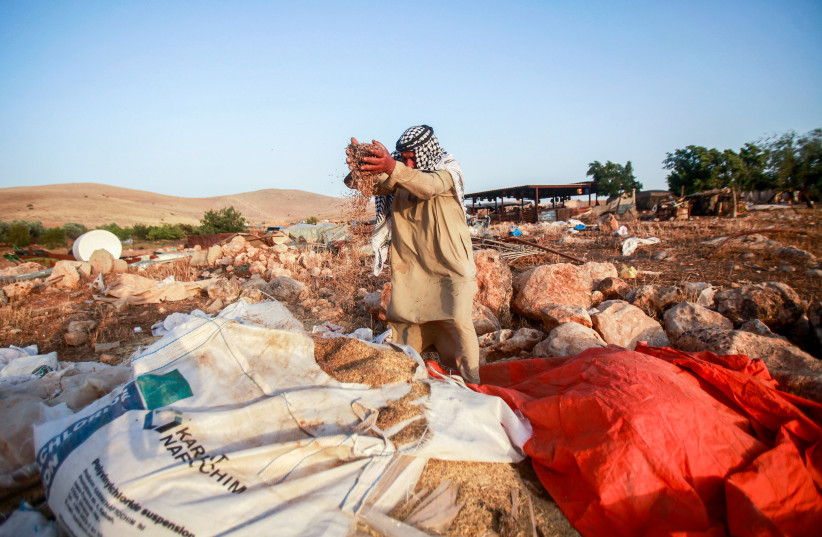On the horrible night of April 13, while Israel underwent an unprecedented Iranian missile attack, disaster once again struck the Negev Bedouin society. Amina Al Hassuni, a seven-year-old girl living in the unrecognized village of Al Fura’a next to the Jewish city of Arad, was sleeping in her bed. When the rockets fell, no alarm sounded in her village.
A piece of metal from an exploded missile passed through the tin roof of her house like a knife through butter.
Her roof was made of tin because the state does not allow proper housing in the Negev’s Bedouin villages. She did not sleep in the bomb shelter because she didn’t have one. She was asleep when the attack happened because her village does not have an alarm system. According to Israel’s security system, she and her village did not exist, and thus, needed no protection.
The Negev Bedouins are neglected by the system.
Rivers of ink poured on papers after the October 7 attack and the following war. Many spoke of “sobering” from an illusion of security and readiness for a national emergency. Only a few wrote about the failure of Israel’s capacities in handling Israel’s civil response to the damage caused to economy and society. Even fewer wrote about the place of Israel’s Arab citizens both in suffering from the consequences of the war (mass loss of income and jobs, more significant than that of Jewish society) and the role of Arab citizens in holding things together (such as over-representation in the medical system, especially in the South and the devoted treatment in incoming patients from the Gaza envelope and the IDF).
Nearly no one mentioned the harm caused to the weakest of the weakest, Israel’s most socio-economically vulnerable citizens – the Negev Bedouins.

The community of 300,000 Israeli Arab citizens took one of the hardest hits – dozens of Bedouin were kidnapped and murdered by Hamas. Many more were killed by direct hits of Hamas rockets, lives that could be saved if only they were protected sufficiently, as most Israelis are.
Many lives could have been saved if the Negev’s Bedouin villages had been covered by the Iron Dome system and if they had a functioning alarm system notifying people of incoming missiles. Although, in the days following October 7, civil society and Jewish American philanthropy heeded the call and established hundreds of mobile shelters in the Bedouin villages south of Beersheba, this was a drop in the ocean compared to the number of shelters truly needed, which is in the thousands. The state promised to follow up but there has been little to no implementation on the ground so far. [The Bedouin are historically a semi-nomadic community, engaged in animal herding and agriculture. Today, there are still some 35 Bedouin villages not recognized by the state.]
In today’s Israel, protection gaps are a question of life and death. Unnecessary loss of life took place on October 7. Doctors are fighting for the life of Amina, who was hit on April 14.
The state of Israel must narrow protection gaps for Israel’s Bedouin citizens, including placement of mobile shelters, building permanent bomb shelters, implantation of complete Iron Dome coverage, and alarms and awareness raising for the local population regarding safe behavior in an emergency. These are the must-haves and not a privilege, especially bearing in mind those Bedouins who saved the lives of Jewish Israelis from the Gaza border communities and the Nova music festival on October 7.
America’s third president, Thomas Jefferson, said over two centuries ago, “There is nothing more unequal than the equal treatment of unequal people.”
It is time for the state of Israel to diminish this inequality that is costing citizens’ lives.
Here’s one suggestion: the government should order Minhelet Tekuma, the reconstruction administration formed after October 7, to add narrowing protection gaps to its list of programs. None of the Negev’s Bedouin villages and towns are included in its duties. The inclusion of all Arab citizens and the creation of a truly shared Arab-Jewish society begins with inclusion under the security blanket of protection.
The writer is co-CEO of the Negev Institute for Strategies of Peace and Economic Development, an Arab-Jewish organization dedicated to social change in the Negev. The organization consists of a team of Arabs and Jews who work together to create a shared society, where Arabs and Jews live together while preserving their respective identity and culture.
